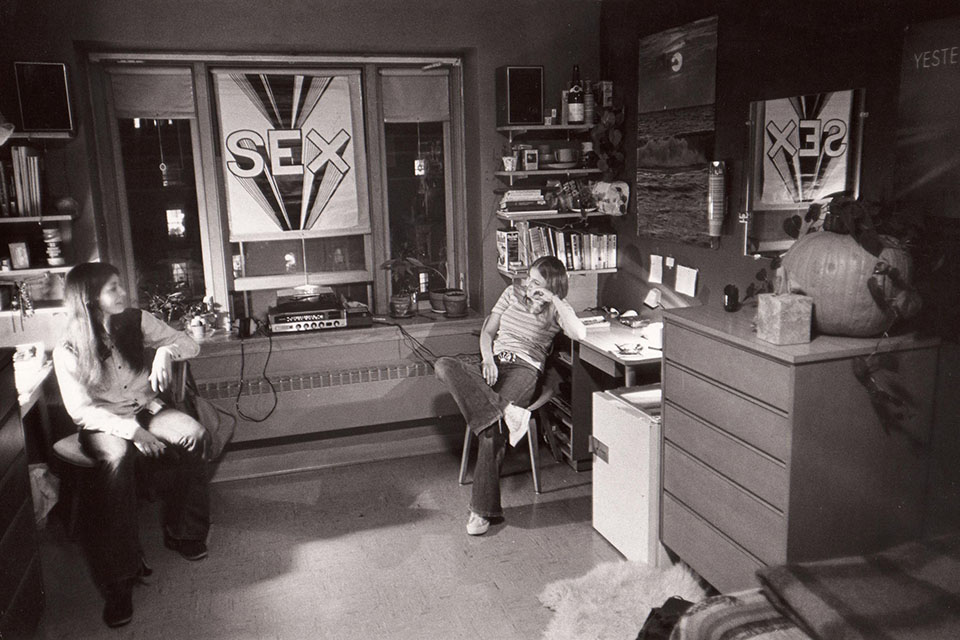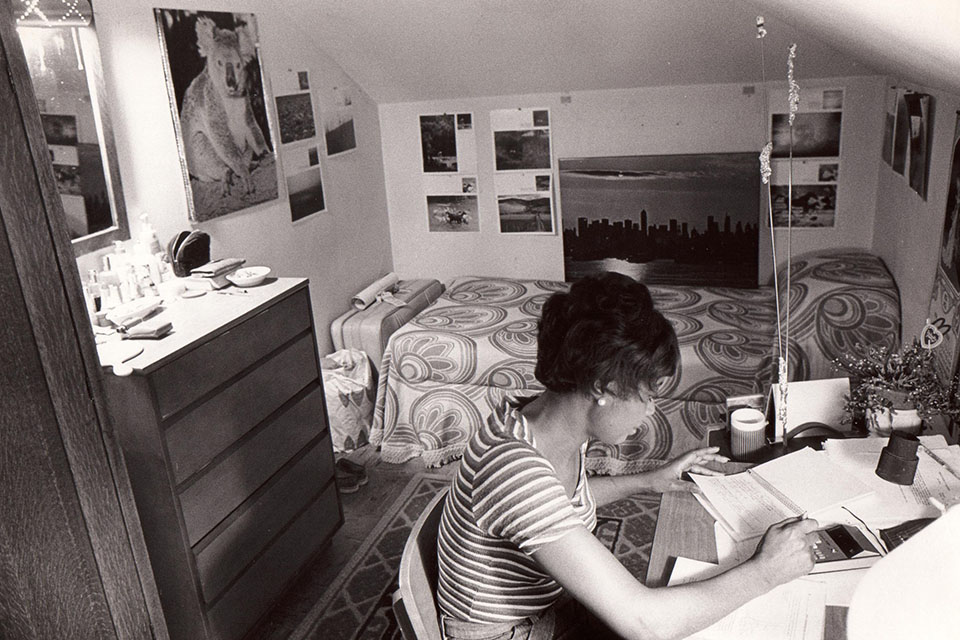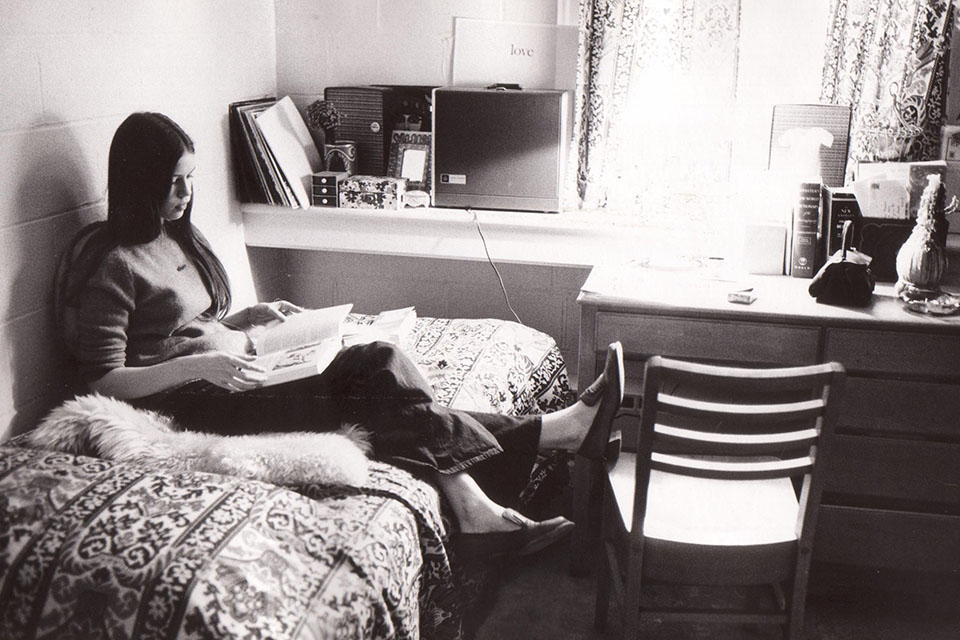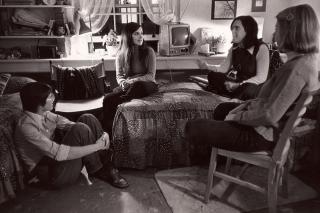In January of 1973, the passing of Roe vs. Wade made abortion access a constitutional right. Deborah Lerner Duane '73 (BA, Communications) grew up in New York State, where abortion was already legalized, and the national ruling came as a relief.
"We probably all knew someone who had an illegal abortion," Duane recalls. "I know of somebody who had medical students do one, which was frightening. I know someone else who nearly bled to death when she was in college. It was good to know there was that option." Before the ruling was passed, while Duane was a Resident Assistant at Simmons, an underclassman became pregnant. "We were trained on what to do — show her what she needed to know and tell our Resident Head. She went to New York to get an abortion."
Linda Adler '73 (BA, Communications) says, "it felt liberating. I was in high school when the [birth control] pill became widely available, and that gave young women a sense of control and freedom that was missing before." Prior to the U.S. Supreme Court ruling on Eisenstadt v. Baird in 1972, unmarried people were not allowed to receive contraception. Adler recalls getting a prescription for the pill from the health center at Simmons.

Claudia Oppenheim Cameron '73 (BA, English) recalls it as a time of thinking about big things, reconsidering a woman's place in the world. "It was electric," she recalls. "A group of women asking, can women have careers? This [the passing of Roe v. Wade] was so powerful in terms of women's rights. I think it touched most people in our class."
As a class, 1973 was accustomed to dealing with big issues. They were freshmen when four students were killed at Kent State during a protest of the Vietnam war. "One of the women killed was a freshman," notes Duane. Simmons students went on strike, along with students at Harvard, Northeastern, and other schools in the area. "My French professor made me tell her in French why I was doing this. It was very important," recalls Duane. "I think it shaped so much of what the Class of 1973 became. We had an all-school meeting in Alumnae Hall to decide if we should join other universities in striking. We were a tiny school of 1,200 women, but we realized that we could make a difference."

Cameron recalls a profound experience of walking through Boston as part of a vigil for the Vietnam war. "Boston was our campus, and I remember such a feeling of unification within the city," she recalls. "While I didn't put myself in the forefront of activism at Simmons, there was an energy on the campus to take action and stand up for ourselves."
In light of the 2022 ruling reversing Roe v. Wade, these alumnae share concerns about the changes they perceive in America. "This was the start of some very powerful changes," Cameron reflects. "Now, where does [the overturning of Roe v. Wade] lead? I worry about the impact on gay rights and other issues that are going to especially impact people of color and those in poverty."

Adler echoes these sentiments. "I don't think [students, today] appreciate what it was like in the 1970s," she says. "Thankfully, our daughters and granddaughters can choose any profession or career. That wasn't available to us. Fifty years ago, the professional world was beginning to open up, but it was very different." In light of the changes in abortion rights, this reflection is all the more valuable. "So many people worked so hard to get us where we were [before Roe was overturned]. Now we're in a bad place where it's going to take a lot of people standing up and showing their unhappiness with what the Republican majority seems willing to do, and the Supreme Court."
So, what can Simmons students do, if they are concerned about the current political climate?
Find Your Kind of Activism
"There is no action that is too small," says Adler. "When faced with these large societal issues, you feel there needs to be a change but can be stymied by thinking, ‘I'm only one person, nothing I do will make a difference.' But it's not true. If everyone does one small thing, it's cumulative. Find a group of people who feel the way you do, and each of you can do what you feel you can."
"When you're a student, you can be overwhelmed by your classes and just getting through college" says Cameron. "But you need to identify organizations that embody your beliefs and get involved with them. In our day, we held vigils and marches against the Vietnam war. There is a niche for each of us. Women are organizing ways to support other women, like providing money and rides to access abortions. Find a way to contribute."
Vote in Every Election
"Become politically active and support candidates who are pro-choice," advises Duane. "Stay active in [the politics in] your home state – it's easier now than it was when we were in school." This message is all the more important, given midterm elections that will take place on Tuesday, November 8, 2022, at which 35 of the 100 seats in the Senate will be on the ballot.
Adler agrees, "If you do nothing else make sure that you vote. Every single vote counts, whether in Massachusetts or in your home state. I've never missed voting, even in local elections. If that's the only thing you do because you are overwhelmed with the rest of your life, it's still so important! Encourage other people to vote, too. For example, as part of an organized effort, I write postcards to people in other states urging them to vote."
Duane urges students to consider the opportunities available. "You are in a very privileged position, at a women's college with an incredible reputation. One person can make a big difference," she says. "Get involved for the sake of the women who can't do what women at Simmons can do. Make a difference, make your voices heard."
Do you need to register to vote? There will be a table for voter registration from October 3-7 in Common Grounds on the Academic Campus. Let's all pledge to vote this November!
Wondering how to engage in activism while at Simmons? The Library's Activist Toolkit is a guide for students interested in getting involved.
For another glimpse into the history of Simmons, visit the Simmons Archives' Activism at Simmons digital exhibit.

